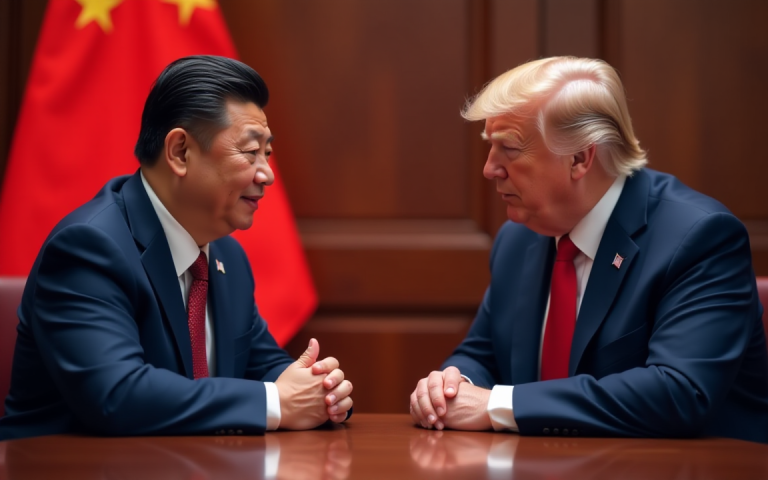China said on Friday that it is assessing recent overtures from the United States to initiate trade negotiations, raising hopes of a potential thaw in the ongoing trade war between the world’s two largest economies.
However, Beijing warned that any dialogue would hinge on the removal of all unilateral tariffs imposed by Washington.
Beijing’s latest remarks come amid a series of conflicting statements from both the Trump administration and Chinese leadership about the status of trade talks, as each side seeks to avoid appearing to make the first concession.
A spokesperson for China’s Ministry of Commerce confirmed that senior US officials had recently reached out “through relevant parties multiple times” in an attempt to begin talks aimed at easing trade tensions that have disrupted financial markets and weighed on global economic sentiment.
“If the US wants to talk, it should show its sincerity and be prepared to correct its wrong practices and cancel the unilateral tariffs,” according to the statement.
Failure to do so, it added, would indicate “an outright lack of sincerity” and could further damage mutual trust.
The United States has imposed tariffs of 145% on a broad range of Chinese goods this year, prompting China to retaliate with levies of up to 125%.
Both sides have since issued limited exemptions on critical products to blunt the impact on their domestic industries.
Markets respond cautiously to potential thaw
Following the Chinese commerce ministry’s statement, the offshore yuan edged up 0.14% to 7.2665 per US dollar.
With mainland Chinese markets closed for a holiday, investors reacted through the Hong Kong exchange, where the Hang Seng Index rose 1.6%.
Despite the market response, there remains widespread skepticism over the likelihood of a breakthrough.
The Trump administration and Chinese leadership have issued a series of conflicting signals in recent weeks, each seeking to avoid the appearance of conceding first.
In a separate interview with Fox News, US Secretary of State Marco Rubio said the Chinese side was willing to talk, suggesting that some form of dialogue could resume soon.
Analysts expect a slow and complex process
Analysts were quick to caution that any progress toward a comprehensive agreement would likely be protracted and fraught with uncertainty.
Dan Wang, China director at Eurasia Group, pointed to the unpredictability of President Donald Trump as a key obstacle.
“The negotiation is difficult to start because Trump is chaotic. China will not risk losing control of the situation just for the negotiation’s sake,” Wang said in a CNBC report.
She anticipates that both sides will only arrange open negotiation after all details are agreed privately.
“A more likely scenario is just a long-lasting painful truce with both sides doing their own type of rolling back in practice without backing down politically in public. It can easily last the entire Trump term,” Wang said.
Alfredo Montufar-Helu, senior advisor to the China Center at The Conference Board, said both sides are expected to hold firm on issues central to their national interests.
“The process is likely to be delicate, as both sides will be reluctant to make concessions on issues they deem vital to their national economic security,” he noted.
“One of the major asks of China will be for tariffs to go back to pre-‘liberation day’ levels, at least during the negotiation period,” he said.
He added that such a move could offer significant relief to businesses in both countries, but it is uncertain whether the Trump administration would agree.
US officials float possibility of phased de-escalation
Some members of the Trump administration have hinted at a willingness to ease tensions.
Treasury Secretary Scott Bessent told Fox Business that current tariff levels are “not sustainable on the Chinese side,” and suggested a “big deal” could be on the horizon.
“Everything is on the table for the economic relationship,” Bessent said.
“First, we need to de-escalate, and then over time, we will start focusing on a larger trade deal.”
White House economic adviser Kevin Hassett echoed that view in a CNBC interview, noting that China’s recent tariff cuts on certain US products may indicate readiness for deeper engagement.
Tariff relief underway, but no formal compromise yet
President Trump this week signed an executive order exempting imported cars and parts from additional tariffs, following earlier relief granted to electronics.
China, for its part, issued waivers on tariffs for a range of American imports, including pharmaceuticals, aerospace components, and semiconductors.
Still, Chinese officials have not softened their stance on the broader political message.
“Although in practice, the effective tariffs on both sides have gone down, the political stance [from Beijing] has not changed,” said Eurasia Group’s Wang.
“China is actively managing this decoupling, not taking the bait from the US,” she added.
The post China signals openness to US trade talks as Hang Seng rises, but deal remains uncertain appeared first on Invezz

